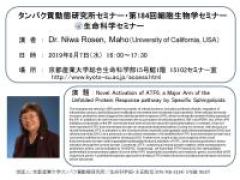生命科学部 生命科学セミナー開催(8月7日)
2019.08.01
タンパク質動態研究所セミナー/第184回細胞生物学セミナー
Dr. Niwa Rosen, Maho(University of California, USA)
Novel Activation of ATF6, a Major Arm of the Unfolded Protein Response pathway by Specific Sphingolipids
The endoplasmic reticulum (ER) performs a variety of critical functions, including synthesis of lipids, regulation of intracellular calcium, and folding and modification of secreted and membrane-bound proteins. When cellular demands increase, proteotoxic stress triggers the unfolded protein response (UPR), which increases the protein-folding capacity of the ER. In addition to its well-known response to the accumulation of unfolded proteins, IRE1 and PERK, two of the UPR initiating components on the ER membrane have been shown to respond to lipid perturbations. In contrast, it has not been reported if ATF6 transmembrane domain can respond to lipid perturbations. During my seminar, I will discuss our recent finding that ATF6 is activated by the increased level of specific sphingolipids called dihydrosphingosine (DHS) and dihydroceramide (DHC) via a previously un-described mechanism. We identified that ATF6 transmembrane domain has a conserved motif that is responsible for binding to DHS. Furthermore, single amino acid mutations in this novel transmembrane domain motif incapacitated sphingolipid-induced activation of ATF6, while allowing proteotoxic stress activation through the luminal domain. Conversely, ATF6 containing a luminal domain mutation, while unresponsive to proteotoxic stress, can be activated by DHS/DHC. Surprisingly, we found that ATF6-induced by the sphingolipids preferentially increased transcription of some of the ATF6 target lipid biosynthetic and metabolic genes, but not that of ER chaperone genes. A potential therapeutic approach for treating ATF6-related diseases including heart disease and stroke will be discussed.
| 日時 | 2019年8月7日(水)16:00 ~17:30(15:45開場) |
|---|---|
| 場所 | 京都産業大学 15号館1階15102セミナー室 |
| 交通 | ※キャンパス内に駐車場はありません。公共交通機関をご利用ください。 交通アクセス |
| 備考 | 事前申込不要・入場無料 |

